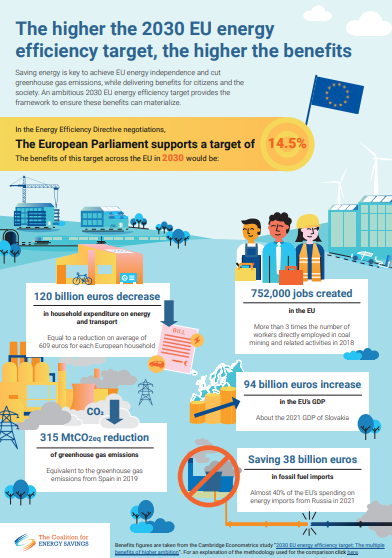The higher the 2030 Energy Efficiency target, the higher the benefits

The Coalition for Energy Savings has commissioned a study to Cambridge Econometrics to quantify the multiple benefits resulting from different levels of ambition of the 2030 energy efficiency target in the Energy Efficiency Directive (EED) recast.
The study models the benefits of the three scenarios that are being discussed in the EED trilogues: an energy efficiency target of at least 9% (Minimum Efficiency), 13% (REPowerEU Efficiency) and 14.5% (Enhanced Efficiency); its main conclusion is that the higher the 2030 EU energy efficiency target will be, the more benefits will materialise for the EU economy, the environment and the society.
The benefits of an enhanced 2030 energy efficiency target are clear and cannot be ignored in the current situation of economic and social turmoil; they must guide the interinstitutional negotiations and be at the core of the political agreement on the EED recast.
RELATED ARTICLES
Planning for the 2023 EED: are EU countries up to the task? Updated analysis, April 2024
The update of the National Energy and Climate Plans (NECPs) is a pivotal first step to ensuring that the objectives of the Fit For 55 Package and REPowerEU are met and the revised legislation, including the 2023 Energy Efficiency Directive (EED), is correctly...
2040 Climate Target: No decarbonisation without energy savings.
On February 6, the European Commission published the communication on the 2040 climate target accompanied by an Impact Assessment (IA). It recommends that the EU cuts its greenhouse gas (GHG) emissions by a net 90% by 2040. The below briefing reviews how energy...
Planning for the 2023 EED: Are EU countries up to the task?
With only seven years to achieve the new 2030 EU energy efficiency target, national measures to implement the Energy Efficiency Directive (EED) must be put in place without delay to accelerate energy saving actions across sectors. While the 2023 EED has just entered...
